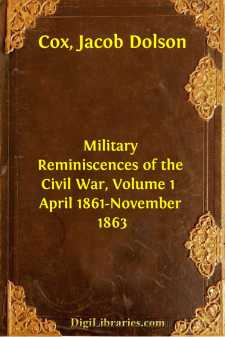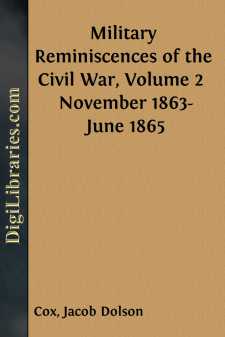Categories
- Antiques & Collectibles 13
- Architecture 36
- Art 48
- Bibles 22
- Biography & Autobiography 813
- Body, Mind & Spirit 142
- Business & Economics 28
- Children's Books 17
- Children's Fiction 14
- Computers 4
- Cooking 94
- Crafts & Hobbies 4
- Drama 346
- Education 46
- Family & Relationships 57
- Fiction 11829
- Games 19
- Gardening 17
- Health & Fitness 34
- History 1377
- House & Home 1
- Humor 147
- Juvenile Fiction 1873
- Juvenile Nonfiction 202
- Language Arts & Disciplines 88
- Law 16
- Literary Collections 686
- Literary Criticism 179
- Mathematics 13
- Medical 41
- Music 40
- Nature 179
- Non-Classifiable 1768
- Performing Arts 7
- Periodicals 1453
- Philosophy 64
- Photography 2
- Poetry 896
- Political Science 203
- Psychology 42
- Reference 154
- Religion 513
- Science 126
- Self-Help 84
- Social Science 81
- Sports & Recreation 34
- Study Aids 3
- Technology & Engineering 59
- Transportation 23
- Travel 463
- True Crime 29
Military Reminiscences of the Civil War, Volume 1 April 1861-November 1863
by: Jacob Dolson Cox
Description:
Excerpt
THE OUTBREAK OF THE WAR
Ohio Senate April 12--Sumter bombarded--"Glory to God!"--The surrender--Effect on public sentiment--Call for troops--Politicians changing front--David Tod--Stephen A. Douglas--The insurrection must be crushed--Garfield on personal duty--Troops organized by the States--The militia--Unpreparedness--McClellan at Columbus--Meets Governor Dennison--Put in command--Our stock of munitions--Making estimates--McClellan's plan--Camp Jackson--Camp Dennison--Gathering of the volunteers--Garibaldi uniforms--Officering the troops--Off for Washington--Scenes in the State Capitol--Governor Dennison's labors--Young regulars--Scott's policy--Alex. McCook--Orlando Poe--Not allowed to take state commissions.
On Friday the twelfth day of April, 1861, the Senate of Ohio was in session, trying to go on in the ordinary routine of business, but with a sense of anxiety and strain which was caused by the troubled condition of national affairs. The passage of Ordinances of Secession by one after another of the Southern States, and even the assembling of a provisional Confederate government at Montgomery, had not wholly destroyed the hope that some peaceful way out of our troubles would be found; yet the gathering of an army on the sands opposite Fort Sumter was really war, and if a hostile gun were fired, we knew it would mean the end of all effort at arrangement. Hoping almost against hope that blood would not be shed, and that the pageant of military array and of a rebel government would pass by and soon be reckoned among the disused scenes and properties of a political drama that never pretended to be more than acting, we tried to give our thoughts to business; but there was no heart in it, and the morning hour lagged, for we could not work in earnest and we were unwilling to adjourn.
Suddenly a senator came in from the lobby in an excited way, and catching the chairman's eye, exclaimed, "Mr. President, the telegraph announces that the secessionists are bombarding Fort Sumter!" There was a solemn and painful hush, but it was broken in a moment by a woman's shrill voice from the spectators' seats, crying, "Glory to God!" It startled every one, almost as if the enemy were in the midst. But it was the voice of a radical friend of the slave, who after a lifetime of public agitation believed that only through blood could freedom be won. Abby Kelly Foster had been attending the session of the Assembly, urging the passage of some measures enlarging the legal rights of married women, and, sitting beyond the railing when the news came in, shouted a fierce cry of joy that oppression had submitted its cause to the decision of the sword. With most of us, the gloomy thought that civil war had begun in our own land overshadowed everything, and seemed too great a price to pay for any good; a scourge to be borne only in preference to yielding the very groundwork of our republicanism,--the right to enforce a fair interpretation of the Constitution through the election of President and Congress....



